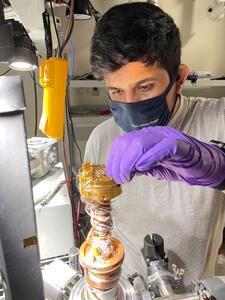The Yale Physics department has joined the presence on West Campus with the labs of Eduardo da Silva Neto, assistant professor in physics, and Steven Konezny, associate research scientist in physics and chemistry, located in the Energy Sciences Institute. Asst. Prof. da Silva Neto’s labs are located in a nearby building, but, “A major renovation at Yale’s West Campus concluded this fall with the expansion of the Energy Sciences Institute (ESI) into consolidated space adjacent to the Institute for the Preservation of Cultural Heritage.
Until now, the Institute’s laboratories have been spread across separate buildings, and for the first time the renovation brings together faculty from numerous disciplines under the same 30,000 square foot roof, as well as creating space for incoming scholars.” [1]
Asst. Prof. da Silva Neto states, “It is exciting to see the consolidation of the ESI laboratories in the same area. We are looking forward to the new collaborations that will emerge from the interactions that will be made possible by these renovations.”
“In my laboratory, we perform scanning tunneling microscopy and spectroscopy experiments that are very sensitive to mechanical vibrations. Our experiments benefit a lot from the laboratory space, which was designed and constructed to be mechanically and acoustically isolated from the rest of the building.”
Associate research scientist Steven Konezny also has facilities in the Engery Sciences Institute, he states, “Like most energy-related research, my work is highly collaborative. I benefit from the proximity of collaborators in the new space. Frequent interactions with colleagues, whether in a neighboring lab or in the cafeteria, has a positive impact on my research. Many a solution to a research roadblock and even collaborative projects have come out of these interactions.
In my group we use theoretical, experimental, and computational methods to study the mechanisms of charge transport and structure-electronic property relationships in materials that are the backbone of many renewable energy strategies such as solar cells, batteries, and fuel cells. These studies inform the design of materials and devices with optimal performance and energy conversion efficiency.”

“Yale’s Energy Sciences Institute was established in 2011 as a hub for interdisciplinary research focused on the physical sciences and a collective focus on scientific approaches to energy. The Institute combines previously unconnected disciplines in a broad effort to tackle one of the grand challenges at Yale and across the world – the need for viable renewable energy and carbon management solutions.” [1]
[1] from the Yale West Campus News article, “Next generation lab space boosts energy exploration at Yale’s West Campus” - see below for full article.

